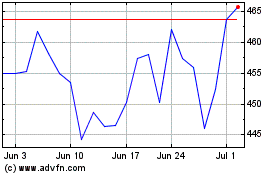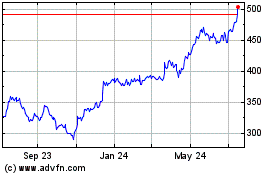Goldman Sachs Reports Surprise Profit Increase -- Update
July 18 2017 - 8:27AM
Dow Jones News
By Liz Hoffman
Goldman Sachs Group Inc. reported a surprise increase in
second-quarter profit despite tough conditions in its core trading
businesses.
The Wall Street firm reported earnings of $3.95 a share.
Analysts had expected $3.39, on average, down from $3.72 a year
ago. Revenue of $7.89 billion fell from $7.93 billion in the second
quarter of last year, and beat analyst expectations of $7.52
billion.
Rivals including J.P. Morgan Chase & Co. and Citigroup Inc.
reported declines in trading businesses last week, and Bank of
America Corp. followed Tuesday morning. Those banks offset trading
slumps with gains in other businesses such as commercial
lending.
Goldman's boon came from a segment it calls "Investing and
Lending," which isn't a distinct operating unit but rather
encompasses loans and equity investments that Goldman makes in
various parts of its business. Revenue increased 42%
year-over-year, mostly from higher valuations for Goldman's stakes
in private companies, many of them technology startups.
For all Goldman's changes since the financial crisis, the firm
run by Chief Executive Lloyd Blankfein is still heavily dependent
on arranging big, complex trades and deals for corporate and
institutional clients. Demand for those services has flagged as
placid markets have churned higher and companies have delayed some
deals, awaiting signs from Washington on tax and regulatory
reform.
Banks rely on idiosyncratic events like the U.K.'s Brexit vote
or the U.S. presidential election to spur trading. There have been
fewer of those kind of events so far this year.
Goldman reported a 17% decrease in trading revenues, the
steepest of any big bank to report second-quarter earnings yet.
Trading revenue fell 14% at J.P. Morgan, 9% at Bank of America and
7% at Citigroup.
Revenue from trading bonds and other fixed-income products
dropped 40%. That business stumbled badly in the first quarter and
has generally struggled to find its footing as volatility remains
low and credit spreads -- the gap between bids and offers where
banks make their money -- have narrowed.
The story was better in equities, which posted its best quarter
in two years. Revenues of $1.89 billion jumped 17% from a year
ago.
Goldman was once the stock-trading king of Wall Street -- it
virtually invented the large institutional "block trade" in the
1960s -- but lost the crown to Morgan Stanley in 2014 and has
fallen further behind since.
Executives say the firm has invested in technology that will
take time to bear fruit, like the 2015 purchase of a Swedish firm
that specializes in ultrafast exchange hookups.
Investment-banking, the business of arranging mergers and
helping companies raise money, reported a 3% decline in revenue
from a year ago. Goldman has leaned hard on that unit in recent
years, though there are signs that it also may be slowing. A record
deal boom in 2015 and 2016 is cooling, and some companies have been
postponing deals as they wait to see if the Trump administration
can achieve promised tax and regulatory changes.
Goldman's return on equity, a key measure of how profitably it
invests shareholders' money, stood at 8.7% in the quarter. Goldman
is one of few banks that has reliably exceeded 10% -- a level
typically demanded by investors -- since the crisis.
Shares of Goldman fell 0.6% to $227.82 in premarket trading. The
stock, before Tuesday, had fallen 4% this year after surging more
than 30% following the election.
Write to Liz Hoffman at liz.hoffman@wsj.com
(END) Dow Jones Newswires
July 18, 2017 08:12 ET (12:12 GMT)
Copyright (c) 2017 Dow Jones & Company, Inc.
Goldman Sachs (NYSE:GS)
Historical Stock Chart
From Aug 2024 to Sep 2024

Goldman Sachs (NYSE:GS)
Historical Stock Chart
From Sep 2023 to Sep 2024
